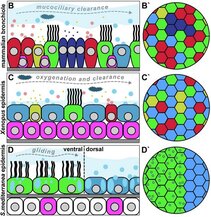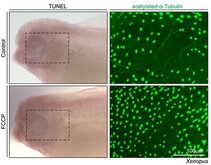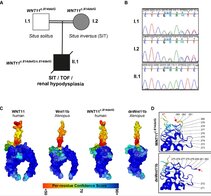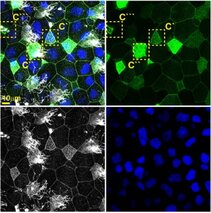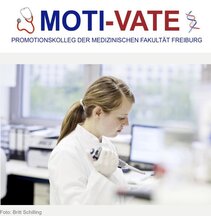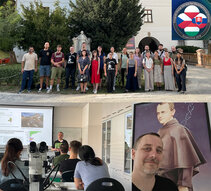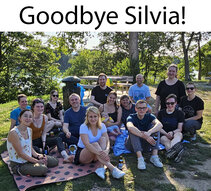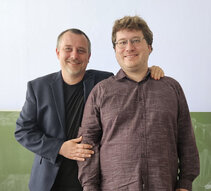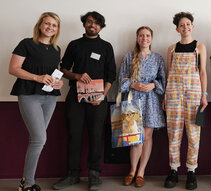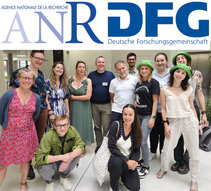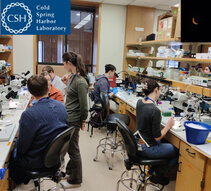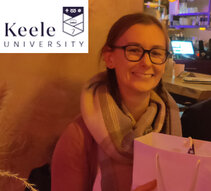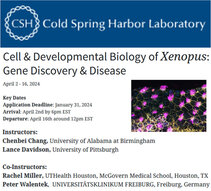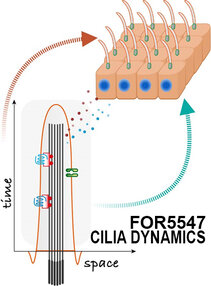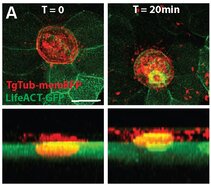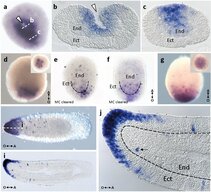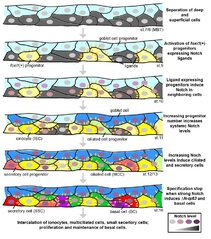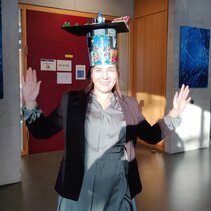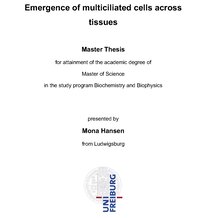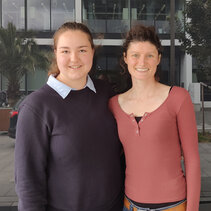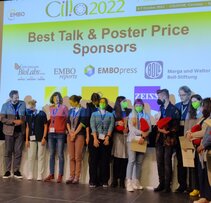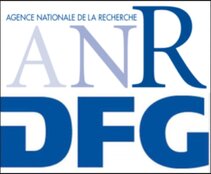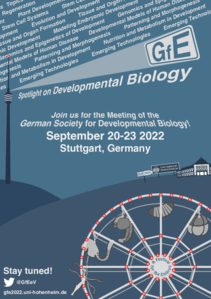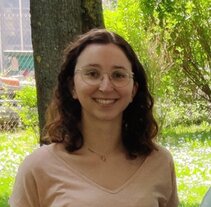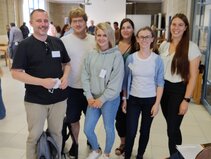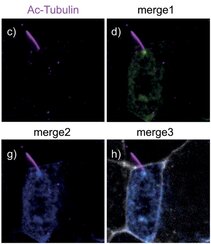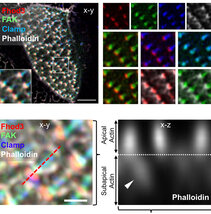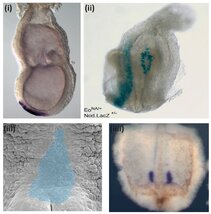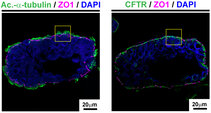03-2025: New article published in Cells and Development discusses how cell type compositions relate to organ functions
In the published article, Peter Walentek discusses how changes in cell type compositions can be generated in development, evolution and disease, and how these changes affect emergent tissue functions across mucociliary systems.
Publication in Cells & Development: www.sciencedirect.com/science/article/pii/S2667290125000269
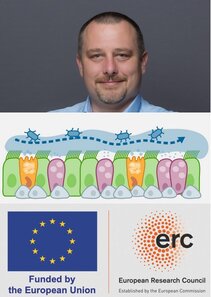
12-2024: ERC CoG funding from the EU to investigate mucociliary adaptations and microbiome establishment
The European Research Council (ERC) funds the Walentek lab and research project “ MAGIX - Mucociliary Adaptations and Gut Microbiome Establishment in Xenopus”.
Mucociliary tissues are true all-rounders: They are made up of mucus-producing cells and cells with tiny hairs, called cilia. In the lungs, they work together to transport dirt, bacteria and other harmful substances out of the body, and in the fallopian tube, they move the ovum. In our project, we want to understand how mucociliary tissues are able to perform protective functions through the combination of certain cell types and how this function changes due to altered cell combinations, for example in diseases or during evolution of organs.
Using a combination of genetic tools, single-cell analyses and mathematical models, we aim to decipher the exact mechanisms behind the formation and function of the cell types as well as emerging tissue functions. "Ultimately, we want to understand which genetic and epigenetic factors ensure that tissues can perform their specific functions," says Walentek.
University Medical Center Freiburg press release (German): www.uniklinik-freiburg.de/presse/pressemitteilungen/detailansicht/4386-europaeische-union-foerdert-forschung-zur-anpassungsfaehigkeit-von-geweben.html
CIBSS article (English): www.cibss.uni-freiburg.de/news/walentekerc

11-2024: Second Funding Period for SFB1453 NephGen!
The DFG confirmed in their latest press release that the CRC 1453 will receive funding for a second funding period. Thank you to all NephGen members, friends and collaborators for all the hard work and dedication to kidney science. Let’s make it an even more successful next four years!
See the DFG press release here (in German).
See the University of Freiburg press release here (in German).
11-2024: New work published in Immunity reveals how acute mitochondrial ATP production is required for apoptosis
In a large collaboration, coordianted and initiated by the lab of Olaf Groß, Damian Weber from our team has used Xenopus embryos to show that findings made in cell lines also apply to the in vivo setting during vertebrate embryogenesis. For that, Damian used the predictable apoptosis of multiciliated cells in the Xenopus emidermis to show that inhibition of mitochonridal activity can suppress apoptosis in such setting. This great collaborative work was now published in the journal Immunity. This work was facilitated by CIBSS in addition to other funding sources.
Publication in Immunity: https://www.sciencedirect.com/science/article/pii/S1074761324004928?via%3Dihub#fig4
11-2024: New work on BioRxiv describing a novel WNT11 variant associated with complex developmental and renal defects
In collaboration with the lab of Miriam Schmidts, we have identified and characterized a novel WNT11 variant in a patient with laterality defects, renal hypoplasia and heart defects. In her MD thesis work, MOTIVATE student Henrike Berns has functionally tested the signaling abilities of the variant human WNT11 ligand. Surprisingly, we found that it encodes a loss-of-function ligand without signaling properties. This was due to minor changes in a few amino acids, which destabilize the ligand and prevents function in normal or dominant-negative signaling properties. Importantly, this indicates that WNT11 has similar roles in human development as has been described in mice and frog embryos, e.g. in kidney and heart development, and it revealed new information about structure-function relationships in Wnt ligands. The study was supported by SFB1453 NephGen and CIBSS. Congratulations Henrike! Read more about it on BioRxiv: https://doi.org/10.1101/2024.11.14.623711
10-2024: New work on BioRxiv describing novel functions of Foxi1 in the generation of multipotent progenitors
How can a single transcription factor have multiple different functions? And why is Foxi1 so improtant for Xenopus mucociliary epidermis development? In our latest work by graduate students Sarah Bowden, Magdalena Brislinger-Engelhardt and Mona Hansen, we have uncovered novel concentration-dependent functions of Foxi1. At low expression levels Foxi1 regulates ectodermal competence through an epigenetic (pioneer like) function, while at higher levels, Foxi1 first induces the generation of multipotent mucociliary progenitors and then the specification of Ionocytes (also called ISCs or INCs in the mammalian kidney). Read more about it on BioRxiv: https://www.biorxiv.org/content/10.1101/2024.10.27.620464v1
10-2024: Incoming medical doctoral student Salina Bauer receives MOTI-VATE fellowship
Congratulations to Salina Bauer for being admitted to the Freiburg medical faculty's MOTI-VATE program. The program in molecular and translational studies for medical doctoral students at the University Freiburg Medical Center provides a coordinated scientific graduate school setting for exceptional students to conduct cutting edge research. Salina Bauer will investigate how mucus secreting cell types and contents are transcriptionally regulated in the Walentek lab. Welcome Salina!!
09-2024: Freiburg hosts the Centennial Spemann-Mangold symposium to celebrate Freiburg’s contributions to understand animal development
It was a very special pleasure and honor to be part of the Freiburg Spemann-Mangold Centennial meeting to celebrate the seminal findings of Hans Spemann and Hilde Mangold (nee Pröscholdt) on the nature of the amphibian gastrula organizer (1935 Nobel prize). Amazing lineup of developmental biology legends and next generation stars! Thanks to the organizers, especially Wolfgang Driever, for this historic event!
09-2024: Xenopus power at the Visegrad Society for Developmental Biology student workshop
A great initiative from V4SDB, Marcela Buchtová and Jakub Harnos to host the student developmental biology course at Masaryk University in Brno, Czech Republic. Besides great students and experiments, we also visited the birthplace of genetics: The Mendel Museum and monastery in Brno!
08-2024: Farewell to Dr. Silvia Fessner (nee Groiss)
We had a lab picknick to say goodbye to Dr. Silvia Fessner, who left the team to pursue other opportunities in industry. It was great to have her as team member and we will all miss you a lot! All the best for your new projects and paths.
07-2024: Congratulations to DR. Maximilan Haas
Congratulations to Max Haas for successfully defending his PhD thesis work on Wnt signaling and secretory cells in mucociliary epithelia (funded by the DFG). Max has elucidated important new mechanisms of mucociliary regulation, and we will miss him in the lab! We wish him all the best for his new position at the University Clinic Düsseldorf in the Institute of Human Genetics.
07-2024: New preprint from the Tay lab allows morphometric analysis of Xenopus cilia
The Tay lab has developed AutoMoFi – a plugin for imageJ that allows a broad range of morphometric analyses in rapis speed. Thanks Tuan for letting me be a small part of the great project!! Congrats.
Title: AutoMorFi: Automated Whole-image Morphometry in Fiji/ImageJ for Diverse Analyses and Discoveries
Link to preprint: https://www.biorxiv.org/content/10.1101/2024.07.26.605357v2.abstract
07-2024: Congratulations to Mona Hansen for receiving a best poster award at the 2024 Amphibian Meeting
Congratulations to MSc Mona Hansen for receiving a poster price for her work on mucociliary patterning in the Xenopus epidermis at the European Amphibian Meeting in Bordeaux. Hooray!
07-2024: ANR-DFG project team meeting and workshop on Xenopus mucociliary biology in Bordeaux, F
We thank the ANR and DFG for funding our collaborative project on epidermal mucociliary patterning together with the team of Laurent Kodjabachian (CNRS, IBDM, Marseille, F), which allowed us to have a big team meeting and to start the European Amphibian Meeting with a workshop dedicated to mucociliary research in Xenopus with early career presenters. We are looking forward to more exchange and exciting findings together with our French partners.
06-2024: Congratulations to MSc Sandra Hägele and MSc Damian Weber
Congratulations to both Sandra and Damian for successfully defending their MSc thesis works on alternative splicing in ciliogenesis (SFB1453 NephGen) and signaling integration through epigenetic components (CIBSS), respectively. We are super happy that both will stay on for their PhD research, on splicing and on dynamic cilia signaling in development (FOR5547 CiliaDynamics).
04-2024: Great fun at the Cold Spring Harbor Xenopus course
It was a great pleasure to co-direct the 2024 Xenopus course together with Rachel Miller, Chenbei Chang, and Lance Davidson. Showing the power of Xenopus to the next generation of scientists and seeing a (almost) total eclipse was a true privilege! Thanks to Chenbei and Lance for running the course over the pandemic time, and looking forward to working with Rachel over the next years to continue to bring the newest technologies to Xenopus researchers.
01-2024: Dr. Charlotte Softley starts her own lab at Keele University, UK
Congratulations to Dr. Charlotte Softley on establishing her own lab in the division of Molecular Structure and Signalling at Keele University. She will use Planaria and Xenopus to study cilia functions and related diseases. We will miss her in our team, but we are excited for the new adventures that await her!
11-2023: Applications are being accepted for the "Cell & Developmental Biology of Xenopus CSHL course" and Peter Walentek becomes co-director
The Cell and Developmental Biology of Xenopus course is designed for those new to the Xenopus field, as well as for those wanting a refresher course in emerging technologies. For instance, participants are able to target their favorite gene by CRISPR/Cas9. The course is open to investigators from all countries and a diverse faculty will bring the most up-to-date results and theories to the students, making this course a valuable resource for young researchers starting out in the fast-moving and expansive field of cell and developmental biology as well as disease modeling. CSHL Courses are intensive, running all day and often including evenings and weekends; students are expected to attend all sessions and reside on campus for the duration of the course. See the roll of honor - who's taken the course in the past (running >30 years!!). Students are supported by various funds and stipend requests do not affect selection decisions made by the instructors.
Link: Course website and instruction for application.
Key Dates
Application Deadline: January 31, 2024
Arrival: April 2nd by 6pm EST
Departure: April 16th around 12pm EST
09-2023: New research unit funded - FOR5547 "Dissecting primary cilia dynamics in tissue organization and function"
Cilia are hair-like structures present on almost every cell of the body. They regulate various processes, including cell signaling and cell divisions. How cilia dynamics in their function, composition and assembly state regulate tissue formation and embryonic development will be investigated by a new DFG Research Unit (RU or Forschergruppe FOR). The FOR5547 "Dissecting primary cilia dynamics in tissue organization and function" is led by Jay Gopalakrishnan (Heinrich-Heine University) and Dagmar Wachten (University Hospital Bonn), and consist of 14 investigators pursuing interdisciplinary research projects on cilia dynamics in tissue formation and organismal health. The Walentek lab will study "The impact of cilium disassembly dynamics on developmental signaling" in collaboration with the labs of David Mick (Saarland University) and Kerstin Feistel (University Hohenheim).
Announcement by the DFG: https://www.dfg.de/service/presse/pressemitteilungen/2023/pressemitteilung_nr_40/index.html
09-2023: Work on removal of multiciliated cells from the Xenopus epidermis published in Development
The Mitchell lab publishes "Bidirectional multiciliated cell extrusion is controlled by Notch driven basal extrusion and Piezo 1 driven apical extrusion" in the journal Development - thanks for the great collaboration!
Open access publication in Development: https://journals.biologists.com/dev/article/150/17/dev201612/326627/Bidirectional-multiciliated-cell-extrusion-is
Preprint on BioRaxiv: https://www.biorxiv.org/content/10.1101/2023.01.12.523838v1
07-2023: Peter Walentek becomes DFG Heisenberg Fellow
Peter Walentek received funding to continue studying "Molecular mechanisms of cilia and mucociliary epithelia". The Heisenberg program of the Deutsche Forschungsgemeinschaft (DFG) aims "To enable outstanding researchers who meet all the requirements for appointment to a long-term professorship to prepare for a senior academic role while continuing their research work." (source: https://www.dfg.de/en/research_funding/programmes/individual/heisenberg/index.html).
06-2023: Study on the evolution of developmental genes published in Scientific Reports
Work from a collaboration with the Kremnyov lab on the "Evolutionary history of the Brachyury gene in Hydrozoa: duplications, divergence and neofunctionalization" is has been published in the journal Scientific Reports and is available open access.
Open access publication in Scientific Reports: https://www.nature.com/articles/s41598-023-35979-8
Preprint on BioRxiv: https://www.biorxiv.org/content/10.1101/2023.01.09.523299v1.
02-2023: New work on Biorxiv on temporal Notch signaling and competetive de-repression by Hes genes in mucociliary self-organization
Ever wondered how an embryo, tissue or organ know exactly how to generate the right combination of cells at the correct ratio? We did too! In our latest work by graduate student Magdalena Brislinger-Engelhardt and in collaboration with Fabian Lorenz and Clemens Kreutz (mathematical modeling), we have uncovered a self-organizing mechanism of mucociliary cell type composition by competitive de-repression of cell fates by a set of differentially acting Hes repressors. Furthermore, we present an in silico model of this process with predictive abilities. Read more about it on BioRxiv: https://www.biorxiv.org/content/10.1101/2023.02.15.528675v1
02-2023: Congratulations to DR. Alexia Tasca for defending an outstanding PhD thesis!!
Alexia Tasca has defended successfully her outstanding doctoral thesis work on "Loss of cilia in primary ciliated cells and multiciliated cells". Hooray, congrats, and well done Dr. Tasca!! Alexia Tasca will start her postdoc soon, and we are already missing her in the lab....
01-2023: New work on removal of multiciliated cells from the Xenopus epidermis available on Biorxiv
How and why multiciliated cells are removed from the epidermis through extrusion and how they choose in which direction they are removed is the focus of new collaborative work with the Mitchell lab entitled "Bidirectional multiciliated cell extrusion is controlled by Notch driven basal extrusion and Piezo 1 driven apical extrusion" available on BioRaxiv: https://www.biorxiv.org/content/10.1101/2023.01.12.523838v1.
01-2023: New preprint on the evolution of developmental genes
New work from a collaboration with the Kremnyov lab on the "Evolutionary history of the Brachyury gene in Hydrozoa: duplications, divergence and neofunctionalization" is up on BioRxiv. You can read the manuscript here: https://www.biorxiv.org/content/10.1101/2023.01.09.523299v1.
12-2022: Mona Hansen graduates with MSc and starts PhD in the Walentek lab
Congrats to master student Mona Hansen for completing her thesis work on the emergence of multiciliated cells across tissues. For her PhD, Mona will work on how mucociliary patterns are generate and locally modified within the international collaborative project: MAP - Multi-modal Atlas of Self-Organized Mucociliary Patterning (together with the Kodjabachian lab) funded by the ANR and the DFG.
10-2022: Henrike Berns and Dr. Silvia Groiss join the Walentek lab
Welcome to medical doctoral student Henrike and postdoc Silvia to the Walentek lab. Silvia will work on cilia disassembly and modeling of human airway diseases and Henrike will work on elucidating the molecular function of ciliopathy patient mutations using Xenopus. We are looking forward to our adventures together!!
10-2022: Another success at the 2022 EMBO Cilia Meeting in Cologne
Congratulations to MSc. Alexia Tasca for winning a best poster award at the 2022 EMBO Cilia Meeting in Cologne. Alexia works on cilia disassembly funded by the DFG. Congrats Alexia!!! And postdoc Charlie gave a fantastic talk on alternative splicing in cilia formation funded through NephGen (SFB1453). Wonderful to have such a phenomenal team :)
09-2022: Walentek (D) and Kodjabachian (F) labs get funding for ANR-DFG collaborative project
We are very grateful for receiving funding from the French ANR and the German DFG for a bilateral collaborative project together with the Laurent Kodjabachian lab (IBDM, Marseille). The project entitled "MAP - Multi-modal Atlas of Self-organized Mucociliary Patterning" will investigate how the correct cell types are put in the right place of the Xenopus mucociliary epidermis, and how cell type compositions affect physiological properties of mucociliary clearance and fluid flow generation. We thank the teams, reviewers and funders for making this project possible!
09-2022: Another Huge Success, this time at the German Society for Developmental Biology Meeting, Stuttgart
Congratulations to Dr. Charlotte Softley and MSc. Maximilian Haas for winning two poster awards at the 2022 GfE Meeting - Spotlight on Developmental Biology in Stuttgart-Hohenheim. Postdoc Charlie works on alternative splicing in cilia formation funded through NephGen (SFB1453), while Max is working on Wnt signaling, stem cells and mucus production in mucociliary epithelia funded by the DFG. Congratulations to both for their outstanding work!!
08-2022: África Temporal Plo joins the Walentek lab
Welcome to África Temporal Plo, who joined the Walentek lab as new PhD student from the International Max Planck Research School for Immunobiology, Epigenetics, and Metabolism (IMPRS-IEM), Freiburg. After her BSc degree in Biotechnology from the University of Zaragoza, Spain, África studied for her MSc in Molecular and Cellular Biology at University of Heidelberg, Germany, and conducted her Masters-thesis work in the Diz-Muñoz group at the EMBL Heidelberg. Now, África will work at the interface between genomics, epigenetics and morphogenesis in Xenopus endodermal mucociliary development.
07-2022: Incoming medical doctoral student Henrike Berns receives MOTI-VATE fellowship
Congratulations to Henrike Berns for being admitted to the Freiburg medical faculty's MOTI-VATE program. The program in molecular and translational studies for medical doctoral students at the University Freiburg Medical Center provides a coordinated scientific graduate school setting for exceptional students to conduct cutting edge research. In collaboration with Dr. Miriam Schmidts (Center for Pediatrics) and Prof. Michael Köttgen (Internal Medicine IV), Henrike Berns will investigate the molecular basis of genetic mutations implicated in heterotaxy and ciliopathies in the Walentek lab. Welcome Henrike!!
07-2022: PhD student Alexia Tasca gets the 2022 CIBSS InteGREATor Award
Congratulations to PhD student Alexia Tasca for being the recipient of this year's CIBSS InteGREATor award, which recognizes an outstanding PhD-student publication related to CIBSS signaling research. Check out her excellent paper: Notch signaling induces either apoptosis or cell fate change in multiciliated cells during mucociliary tissue remodeling (2021 Developmental Cell). Hooray Alexia!!!
06-2022: Huge Success at the European Amphibian Meeting, Ghent
Congratulations to Dr. Charlotte Softley and BSc. Mona Hansen for winning two poster awards at the 2022 European Amphibian Club Meeting in Ghent, Belgium. Postdoc Charlie works on alternative splicing in cilia formation funded through NephGen (SFB1453), while Mona is setting up the Xenopus foregut epithelium as new model to study mucociliary epithelia. Additionally, MSc. Maximilian Haas (Wnt) and MSc. Magdalena Brislinger-Engelhardt (Notch) gave fantastic talks on their signaling work in mucociliary patterning and disease. What a spectacular meeting for the group. Thanks to Kris Vleminckx and his team for the great organization!
05-2022: New study connects protein homeostasis to cell signaling and cilia
A long-term collaboration between the Pfirrmann lab (Potsdam), the Hollmann lab (Halle) and the Walentek lab (Freiburg) leads to another collaborative publication driven by the Pfirrmann lab (HMU Potsdam). The study uncovers novel connections between cilia, proteostasis and cell signaling.
Link to study: https://journals.biologists.com/jcs/article/135/9/jcs259209/275349/Cilia-localized-GID-CTLH-ubiquitin-ligase-complex
05-2022: New Xenopus and Zebrafish research platform for Freiburg gets DFG approval
We are very happy to announce that the DFG approved our newly established research platform!
AquaCore - The Aquatic Core Facility for Zebrafish and Xenopus research
The mission of the Aquatic Core Facility (AquaCore) is to provide scientists with a state-of-the-art platform to conduct aquatic animal experiments (Xenopus laevis, Xenopus tropicalis, Danio rerio). Researchers are provided with infrastructure to experiment in accordance with EU and national legal requirements. Above all, the facility staff are implementing new strategies according to the ʻ3Rʼprinciple (reduce, replace, refine) in laboratory animal science.
Read the press release by CIBSS here: Kidney Research in the Aquarium
04-2022: Study reveales novel role for micro-ridges in the formation of motile cilia
A multi-lab collaboration across faculties at the University of Freiburg and the University Freiburg Medical Center driven by the Walz lab (Nephrolab) reveals new mechanisms for the interaction of basal bodies and the cytoskeleton, which are necessary for cilia formation and polarization in multiciliated cells. Thanks to CIBSS and NephGen for creating an outstanding culture of collaboration and exchange, which forms the basis for studies like this!
Link to study: https://www.nature.com/articles/s41467-022-29741-3
04-2022: Collaboration sheds light on genetic causes of laterality defects
A multi-lab collaboration across faculties at the University of Freiburg and the University Freiburg Medical Center driven by the Schmidts lab (Center for Pediatrics) reveals the basis of laterality defects. Thanks to CIBSS and NephGen for creating an outstanding culture of collaboration and exchange, which forms the basis for studies like this!
Link to study: https://www.frontiersin.org/articles/10.3389/fgene.2022.861236/full
01-2022: New airway organoid model for diagnosis and drug development
In an international collaboration driven by the Finkbeiner lab (University of California San Francisco) together with the Walentek lab, we have developed a new method to quickly, easily and inexpensively grow mucociliary organoids from patient material for diagnostic and drug development purposes. This way, personalized medicine will not be affortable only to the rich in the future.
Read press release here: Lung Tissue from the Lab
12-2021: The Walentek lab moves into new research building IMITATE
After some COVID-19 related delays, the Walentek Lab moves into the new research building of the University Freiburg Medical Center: IMITATE - Institute for Disease Modeling and Targeted Medicine.
Our work will be even more supported through great infrastructure, furthered through more collaborations between clinic, university and collaborative research units (SFB1453, CIBSS), and integrated state-of-the-art imaging facilities (EM and light microscopy). We are looking forward to more exciting adventures at the interface of basic biology and translational studies!


